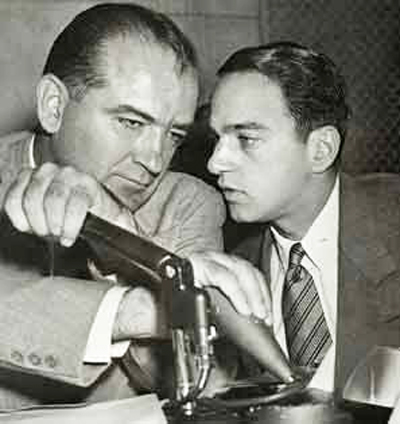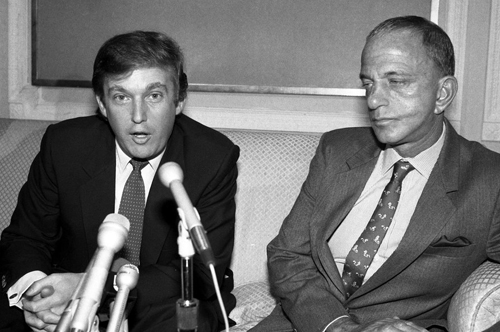Second Korea War looms as Trump and American reactionaries replay scripts from the Trump-supported McCarthy years against 'North Korea'...
 A young Roy Cohn (right) with U.S. Senator Joe McCarthy during hearings at the height of the "McCarty Era." McCarthy, who was a popular senator from Wisconsin, gave his name to an age of extreme reactionary anti-Communism that in part gave the world the First Korea War. After McCarthy was finally discredited and drank himself to death, Cohn went on to a successful legal practice in New York City, where among other activities he mentored a young Donald Trump.Let's call it what is is and has been, the "Second Korea War", just as we should have called the American phase of the Vietnam War the "Second Indochina War". Must more accurate historically in both cases. And so, as Donald Trump, now the most famous coward who dodged the Vietnam draft like most privileged and rich men of the era, pounds the war drums to become a "War President," it's time to take another look at the First Korea War, the one that involved the United States (under what amounted to a phony United Nations flag) from 1950 through 1954 (and in some ways, still to this day in 2017).
A young Roy Cohn (right) with U.S. Senator Joe McCarthy during hearings at the height of the "McCarty Era." McCarthy, who was a popular senator from Wisconsin, gave his name to an age of extreme reactionary anti-Communism that in part gave the world the First Korea War. After McCarthy was finally discredited and drank himself to death, Cohn went on to a successful legal practice in New York City, where among other activities he mentored a young Donald Trump.Let's call it what is is and has been, the "Second Korea War", just as we should have called the American phase of the Vietnam War the "Second Indochina War". Must more accurate historically in both cases. And so, as Donald Trump, now the most famous coward who dodged the Vietnam draft like most privileged and rich men of the era, pounds the war drums to become a "War President," it's time to take another look at the First Korea War, the one that involved the United States (under what amounted to a phony United Nations flag) from 1950 through 1954 (and in some ways, still to this day in 2017).
One of the biggest scams currently being run on the American people (in some ways from both the "left" and the "right") is that the issues in the current Korea shouting are about nuclear arms and the fear of nuclear war. But in fact, as many histories point out (some more inclusively than other), the issues in Korea have been the same for more than 100 years -- Korean independence versus various colonialisms (not just "Western" since the most vicious was run by Japan) that have sponsored "South Korea" since the early years after World War II.
But a scan of the current headlines in August 2017 demonstrated that the childish macho rhetoric of both the President of the United States and the Supreme Leader of "North Korea" are creating fears of a nuclear war (the world is already in a nuclear confrontation)...
But among the many questions that are barely being asked is why a world power has the right to police a small nation's development of nuclear arms. And in the context of Korea, that question then goes to the question of what the United States has been dong in Korea since 1945 (and 1946) as the USA, according to every history, installed the same people who had been brutally running the Japanese occupation of Korea in power following the Allied victory over Nazism in Europe and Japanese Imperialism in the Pacific. The main difference came over who was in power in what part of Korea (which was supposedly temporarily divided in 1945). In the North, a Communist government headed by men who had fought for Korean independence against Japan, was put into power with the help of the Soviet Union. And at the time, the Soviets were in the northern part of Korea because the Allies had agreed to in. In exchange for the Russian agreement to begin its war against Japan after the defeat of Nazi German in 1945, the government of the United States thanked the Soviets for fighting the huge Japanese armies in Manchuria, China, and Korea.
 Long after Joe McCarthy died, McCarthyism lived on, especially in the person of powerful New York lawyer Roy Cohn (above right). Cohn served Donald Trump for more than a decade as a lawyer and mentor. Trump may be said to be using the Cohn playbook in the current bellowing about the right of "North Korea" to have nuclear arms and the anti-Communism behind much of the support Trump is now receiving from Americans.Of course, a revisionist history now claims that the Soviets were not needed to "win" the Pacific War, because the surrender of Japan was ensured by the atomic bombs dropped on Hiroshima and Nagasaki Japan during the first ten days of August 1945. But a lot was more complex than than has been rendered as "history" since.
Long after Joe McCarthy died, McCarthyism lived on, especially in the person of powerful New York lawyer Roy Cohn (above right). Cohn served Donald Trump for more than a decade as a lawyer and mentor. Trump may be said to be using the Cohn playbook in the current bellowing about the right of "North Korea" to have nuclear arms and the anti-Communism behind much of the support Trump is now receiving from Americans.Of course, a revisionist history now claims that the Soviets were not needed to "win" the Pacific War, because the surrender of Japan was ensured by the atomic bombs dropped on Hiroshima and Nagasaki Japan during the first ten days of August 1945. But a lot was more complex than than has been rendered as "history" since.
Those who wish to learn something about the nuances of Korea's recent history can consult any number of books in English (and many more in Korean) that try to set an addled record straight. Among those, in my opinion, the two best are I.F. Stone's "Hidden History of the Korean War" and Bruce Cumings's "The Korean War." Stone's important history is currently out of print, but still available. The Cumings book is relatively new, publish by Modern Library in 2010 (following earlier more detailed studies by the same author). Both books make the point that long before the massive suffering that the "Korean War" caused (most of it, noted by everyone, suffering by the people of Korea, both "North" and "South"), Korea had been suffering under Japanese occupation. And the Japanese, in one sense, never left.
Just as the United States hired former Nazi rocket scientists (and slave labor owners) like Werner Von Braun at the dawn of the Cold War, so that "free world" answer in "South Korea" was a government most (not entirely) staffed by Korean quislings who had just served the Japanese. (Although the president of "South Korea', Syngman Rhee was not a Japanese flunky, most of his government, including his police, were). As a result, the look of the so-called "Free World" from the point of view of patriotic (i.e., anti Japanese) Koreans was much the same as the way the "Free World" anti-Communists looked in Eastern Europe by 1946: the old Nazis with new uniforms. (The two most notorious Nazi groups recruited by the USA after World War II were the rockets scientists and the "Gehlen Org" -- the spies who had monitored the Soviets as Nazi spies in the "East").
While it would be best for readers to concentrate today on actually digging into the history now unfolding before all of us by read both "The Hidden History..." and "The Korean War," it's possible to summarize quoting from these books (and others).
One story that came up on August 11, 2017, tells part of the current stories:
8 in 10 Americans Fear Nuclear War as Trump Says US 'Locked and Loaded'
By Jon Queally, August 11, 2017, Common Dreams (via Truthout)
Psychologists say public anxiety is what you would expect from president's "fire and fury"-style rhetoric as poll shows huge majority "fearful" of nuclear war with North Korea
New poll results released Friday [August 11, 2017], provided exclusively to Axios, show that more than 8 in 10 Americans are fearful of nuclear war breaking out between the United States and North Korea.
And why shouldn't people be afraid? Early Friday morning, the president said the U.S. military is "locked and loaded" regarding North Korea.
"Military solutions are now fully in place,locked and loaded,should North Korea act unwisely. Hopefully Kim Jong Un will find another path! — Donald J. Trump (@realDonaldTrump)"
Commissioned by Vote Vets, a left-leaning political action group which advocates on behalf of U.S. veterans, the poll shows that Americans are both paying attention to — and increasingly worried about — the tensions stirred by President Donald Trump's bluster and threats towards North Korea and fears that Pyongyang may itself try to launch a nuclear attack.
The new poll arrives after Trump on Thursday said maybe his recent threats to bring down "fire and fury" against North Korea were not "tough" enough and ahead of upcoming (and large-scale) U.S.-South Korean war games which foreign policy analysts warn will only exacerbate tensions.
As reporting on Friday by the Canada Press explains, psychologists say such widespread "public anxiety" can erupt quickly when a figurehead like Trump is making the kind of statements he's made this week:
"While the escalating rhetoric may be mere sabre-rattling, psychologists say feeling fearful or anxious about the threat of a nuclear holocaust, or any life-altering catastrophe, is perfectly normal.
"Sometimes we might experience a sense of being in constant danger, especially if we're questioning if there's this threat to life and safety," said Dr. Katy Kamkar, a clinical psychologist at the Centre for Addiction and Mental Health in Toronto.
"And it becomes not only the concern for the safety of self, but then, of course, for the safety of loved ones, the destruction of everything we have established," she said.
Meanwhile on Friday, China appeared to issue a warning to North Korea — via a "semi-official" newspaper editorial — that if it did launch any attack on the U.S., it would effectively be on its own.
While voices for peace and de-escalation continue to call for diplomacy and denounce Trump's "lunatic" behavior, 60+ Democrats on Thursday sent a letter to U.S. Secretary of State Rex Tillerson urging him to facilitate a reduction in the counter-productive provocations and proclamations coming from the White House.

